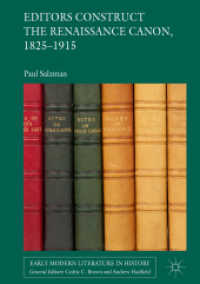- ホーム
- > 洋書
- > ドイツ書
- > Social Sciences, Jurisprudence & Economy
- > Politics, Society, Work
- > miscellaneous
Full Description
This first of two volumes explores how contemporary Asian popular culture reflects and critiques social issues. It showcases ongoing developments in Asian popular culture in the wake of the global popularity of Squid Game and in anticipation of its second season release in December 2024.








